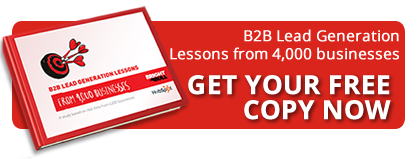 So you think your events business is great at lead generation because you’re handing a tonne of names over to sales each week? You couldn’t be more wrong. Lead generation for events is officially broken in the vast majority of events businesses. Why? For starters, because a click-through is not a lead, yet most companies treat them as such. Find out why your lead generation process may be broken and what to do to fix it.
So you think your events business is great at lead generation because you’re handing a tonne of names over to sales each week? You couldn’t be more wrong. Lead generation for events is officially broken in the vast majority of events businesses. Why? For starters, because a click-through is not a lead, yet most companies treat them as such. Find out why your lead generation process may be broken and what to do to fix it.
Here are the 6 main lead generation problem areas that we have identified and our simple guidance for what you need to do to fix each one:
1. You don't have engaging content to support your event.
Now, if your event website’s looking about as bare as Kim Kardashian’s behind, you need to start creating some killer content to cover that real estate. And not for modesty’s sake. Strong, engaging B2B content is at the crux of every decent lead generation process, because it’s how strangers get to know your event brand. And that’s how you turn strangers into leads.
One click from an email is not evidence that someone knows your event brand well enough to want to talk to your sales people about whether they’ll attend. That’s like proposing on the first date. Content gives you the opportunity to develop the relationship with your prospects (if they’re willing) so you’re only taking the fairly big step of intruding on their work day by phone when they’re good and ready to take that call.
Content marketing generates 3 times as many leads as traditional outbound marketing, but costs 62% less.(Demand Metric)
2. You don't target your buyer personas individually.
So, before you go haring off into the event and conferencing sunset, creating content all over the shop, we need to have a chat about buyer personas. Because most of you don’t use them nearly enough. And it’s hurting your lead generation efforts.
Targeting your content and communications according to the different buyer personas that attend your event will totally transform the quality and quantity of your leads. Make sure sales know which persona is attached to a lead (plus what that means for the way they should be talked to) and you vastly reduce the risk of that lead being burned.
71% of B2B marketers use content marketing to generate leads. (MarketingProfs)
3. You give sales too many names and not enough data.
Meaning you hand lists of clicks and content downloads to sales with no explanation. In an environment of declining delegate sales, event sales teams often get a really bad rap for burning through lists of leads supplied by marketing with nothing to show at the end of it. But often, the fault actually lies with marketing. If you’re handing over lists and lists of names with little or no explanation of what the person did to join it/the journey, it’s you that’s failing when the sale dies, not the rep.
Now in an ideal world, we’d all have a fancy CRM that captured all this information against the person’s record and so it’d be simple to see that person’s history of interactions with the company and brand. But the reality for most event businesses is that inadequate, outmoded or disjointed technology stands in the way of this “dream scenario”. Which means you need to communicate more effectively and work smarter with your sales team. If you leave them to call everybody, don’t be surprised if they don’t get through to anybody.
4. You and your sales team exhaust your database with email.
I make this next point hoping that she doesn’t read this but here goes. I love my mother-in-law, I really do. But sometimes when the phone rings and I see her name I just can’t bring myself to pick up. Why? Because she emails me pretty much every day to tell me what’s going on anyway. And if I do pick up, I just get the same message from the emails told to me again on the phone.
Sound familiar? Yes? Bad news, you are like my mother in law. You email and email and email, then wonder why your database doesn’t want to take the call from sales to hear the same stuff they’ve been bombarded with the last few weeks. Stop. Your lead generation process will thank you for it. As will your database.
Don't forget, your sales team are very likely spending more time emailing your (technically) "list of hot leads" than calling them. Why, it's simply much easier, quicker and let's accept it, many people don't answer their phones these days.
So in a nutshell the database is getting hit from both sides - marketing and sales and usually without any elegant coordination.
89% of marketers say that email is their primary channel for
lead generation. (Mailigen)Only 13% say their lead generation strategies are “very successful” in achieving their main objectives. (Ascend2)
6. All your campaigns lead to your homepage.
If you don’t consider this a problem, you’ve obviously never experienced the power of a well-constructed landing page. A decent landing page, with a single call to action and a focus of message directly related to where the visitor is arriving from will outperform your homepage to a staggering degree.
It shouldn’t surprise you. After all, in our landing page scenario; you get a message, it makes you click, and you get what was promised in that message when you click. You are happy and go on to engage with the content. When your destination becomes the homepage you don’t immediately get what you wanted. You have to hunt around for it. Which no one wants to do.
Not only that, test your landing pages against each other and you’ll benefit even more. Where’s my proof? Here. President Obama raised an additional $60 million, using A/B Testing. Do it.
Companies with 40+ landing pages get 12 times more leads than
those with 5 or less (Hubspot)
7. You don't score your leads or value sales feedback.
If you have no way of classifying what is or isn’t a lead, i.e. profiling a lead, if you have no way of telling the value of those leads apart, then listen up. You are missing out. Ditto if all you hear when sales gives you feedback on your leads is an intermittent whine.
You have limited sales resources; it makes sense that everyone should be focussed on making every call count. And your role in this is making sure that you’re only getting them to call the best names, the most promising leads that are the most engaged with your event brand. Not all leads are created equal. If you treat them as if they are, you will make fewer sales. Sales teams are also a valid source of feedback and information for re-qualifying of your leads (good and bad). Listen. Don’t write off what you’re hearing as whinging before you’ve checked it out.
The biggest challenge B2B marketers face in regards to lead generation is generating high-quality leads (61%).
(B2B Technology Marketing Community)
Conclusion
Lead generation for events has a long way to go before it’s considered a shining example for other business types, but the fixes aren’t unattainable or even particularly difficult if you’re prepared to put a little time and effort into thinking through how to achieve them. It can be hard to make changes under the intense pressures of an event campaign, so it may be more achievable to break it up into bite sized chunks. Make one change across your whole portfolio; make all the changes on one event, whatever gets you going in a forward direction for fixing your lead generation process.

